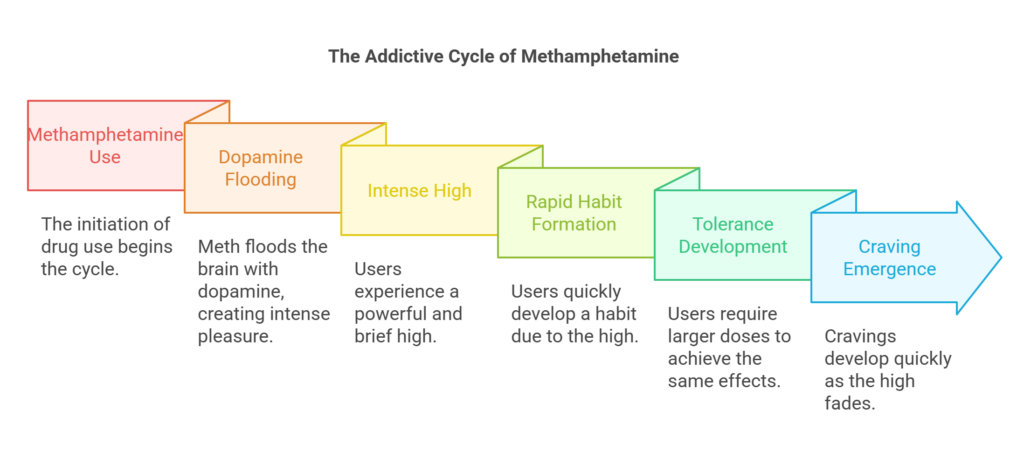If you believe that addiction is something that takes time, then meth is here to correct you. The minute meth gets into the system, it takes over the brain and even produces an initial rush that users cannot resist. Meth is one of the most addictive street drugs and is characterized by high intensity, and is one of the hardest substances to quit.
Methamphetamine, or meth for short, is not only addicting, but due to this vicious cycle, individuals can become dependent almost instantly with only one or two uses. Meth use is devastating for the user and their loved ones; learning why this drug is so addictive might make those in need of help open to treatment.
How Meth Works in the Brain and Body?
How addictive is meth? This is at least partly because this stimulant works in the brain to flood it with dopamine, which is the chemical that biologically creates pleasure and motivation. This release of dopamine is ten times stronger than the normal levels of dopamine in the brain. No wonder repeated returns to meth are common, to seek that electrifying high, time and time again.

It is for this reason that the creation of meth makes how addictive is meth a question that people are compelled to seek answers to, with particular emphasis placed on the physical and psychological dependency factor. Let’s look at why meth is considered one of the hardest drugs to quit:
One of the probably uniquely characteristic features of meth addiction is that it occurs quickly and significantly changes the functioning of the human brain so that meth users believe they are unable to live without it. This level of dependency answers the question of how addictive meth is and why it is a fact that many experience.
How addictive is meth? Meth addiction is much more than just a mental obsession. It comes with serious health implications across every aspect of human anatomy. For those addicted, it is not long before such risks will reach alarming levels, leading to long-term negative effects.
People struggling with meth addiction are likely to experience a range of health problems:
In the U.S. alone, over 1.6 million people reported using meth in the past year. Knowing how addictive meth is sheds light on why early intervention is critical to prevent further health complications.
Sometimes there may be conspicuous signs that exhibit the propensity of a person to take meth, and therefore it may be important to look out for such symptoms so that the person can get help early enough. Here are some red flags that may indicate someone is struggling with meth dependency and show how addictive meth is:
If any of these symptoms are familiar, then it is advisable to seek help to avoid the situation getting worse. These signs show just how addictive meth is and the need to get help if and when one is an addict.
How addictive is meth? It’s one of the most addictive substances, and here’s why:
These effects make how addiction is meth very evident. Withdrawal from meth is also very difficult and nearly impossible to do on one’s own.
To be able to find out how addictive is meth, certain facts must be understood. Meth addiction is not a small problem. Here are some important points:
This is why it is such a pertinent question to ask how addictive meth is, due to facts like these needing professional assistance to quit.
Getting off meth may not be easy, but with proper help, you can overcome this addiction. Realizing how addictive meth is helps to understand why Relevance Recovery provides a supportive and efficient treatment to regain control and start a healthy lifestyle.
These other supportive recovery options can go a long way in helping those seeking a way out from meth and regaining a new life. Considering how addictive meth is, Relevance Recovery ensures that each program designed targets the specific aspects of meth addiction.
It’s important to note that the addiction to meth does not have to be a lifelong sentence. Knowing how addictive is meth only proves the reason why one needs help. There are existing treatment procedures and forms of support that help the victims to recover fully.
Conclusion
How addictive is meth? This catastrophe is not only powerful and destructive, but recovery from it is also possible. While defining how addictive meth is might be a challenging question, receiving proper treatment from Relevance Recovery, it’s possible to leave meth behind for good.
Take the First Step Today
This question may seem daunting, as you are probably wondering how addictive meth is. Still, Relevance Recovery has got you covered with all the necessary tools, support, and understanding needed to get rid of this Meth Addiction. Our method is based on the usage of scientifically proven treatments accompanied by our care to get your life back on track. Reach out to Relevance to start your journey toward a better quality of life without substance dependence.